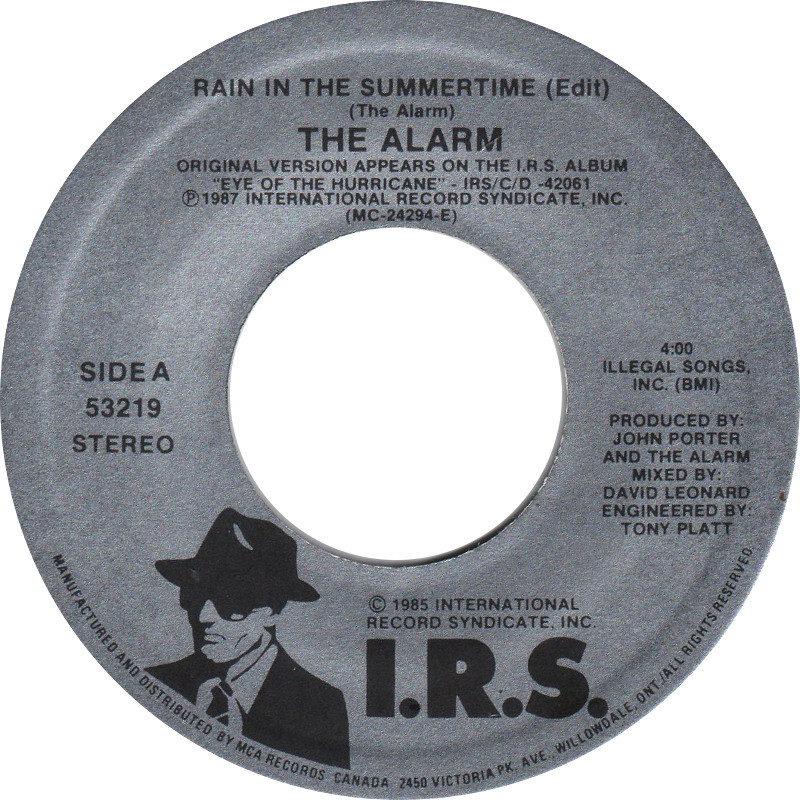The 19th of November, 1987, was a day that changed my musical trajectory. Like many weeks, I tuned into TopPop, the Norwegian music chart show, hoping to discover something new amidst the usual pop fare. That evening, the screen introduced me to a figure radiating passion and authenticity, someone who spoke of music with a depth rarely found on such programs.
This was Mike Peters, the frontman of The Alarm, in Norway to promote their latest single. His interview was a breath of fresh air, injecting genuine substance into a show often focused on superficial trends. Peters spoke with fervor about music’s inherent passion and his band’s distinct identity.
 Mike Peters of The Alarm passionately discusses his band's music and Welsh roots
Mike Peters of The Alarm passionately discusses his band's music and Welsh roots
What immediately struck me was his profound connection to Wales, his homeland. His pride was palpable as he explained, “Many people hear folk influences in our music. That’s where the roots of The Alarm are in vogue. We live in a country called Wales, and it’s a Celtic land. It’s a place that we go to and we draw from musically. Our album ‘Eye of the Hurricane’ was written there, and a lot of the songs have a subtitle on the album sleeve, and that is the place they were written.” This sense of place, of musical heritage rooted in Celtic tradition, was captivating.
When asked about The Alarm’s commitment to guitar-based rock in a synth-dominated era, Mike’s grin was infectious. “Because that’s what rock’n’roll is about,” he stated simply. It was a classic rockstar answer, yet it felt utterly genuine, devoid of artifice. Here was a man driven by a clear vision and a genuine love for his craft.
By the end of that interview, I was captivated. Before even hearing a note of their music, I was already a fan. Mike Peters’ mindset, his unwavering positivity, his evident passion, and his deep-seated love for his Welsh identity, resonated deeply. His open embrace of folk and Celtic influences, worn proudly on his sleeve, reminded me of another beloved band, Big Country – a connection that would later become even more tangible when Peters fronted Big Country himself.
Then came the music video for Rain In the Summertime. This was my first encounter with The Alarm’s music, and it was instant infatuation. The visuals, the underlying message, Peters’ impassioned vocals, the song’s infectious guitar riffs, and the band’s overall sound – it all clicked. And let’s be honest, they looked undeniably cool in that video. It was clear this was a single, a radio-ready hit, yet it also hinted at a depth beyond typical chart-toppers, sparking my curiosity to explore the rock and roll, perhaps even the Celtic-infused elements Mike had alluded to.
It wasn’t long before I was immersed in The Alarm’s back catalog, making up for lost time. That initial interview and the Rain In the Summertime video ignited a love affair with the band that continues to this day.
Given the song’s undeniably upbeat and summery vibe, it’s surprising to learn that the album sessions that birthed Rain In the Summertime were anything but harmonious. As The Alarm convened in early August 1986 to begin work on their third album, tensions within the band were reaching a breaking point.
A core issue was a division in songwriting approaches. The prolific duo of Mike Peters (lead vocals/guitar) and Eddie Macdonald (bass/vocals) consistently generated a wealth of material. Their demos and song ideas were always plentiful whenever the band gathered to record, and their compositions dominated the band’s albums.
The other songwriting partnership, Dave Sharp (lead guitar/vocals) and Nigel Twist (drums), also contributed material, but not with the same volume or perhaps perceived consistency as Peters and Macdonald.
From the outset, the band had agreed that song selection would be based on quality, regardless of authorship, with the producer acting as an impartial arbiter. However, producers frequently favored the Peters/Macdonald material, breeding resentment among Sharp and Twist.
The issue wasn’t primarily financial. Early on, The Alarm had established a 40% equal split of publishing income, aiming to preempt monetary disputes. Mike Peters, in the 2000 remaster liner notes of Eye of the Hurricane, suggested the conflict was more about creative direction.
“Dave and Nigel were mainly unhappy with the way we worked creatively,” Peters explained. “What Dave really wanted was not only parity from a publishing point of view, but much more creative control over the musical direction the band was going in. Dave hadn’t contributed any of the songs included on the previous ‘Strength’ album, apart from a co-writing credit on the title track. Instead of concentrating on writing the best songs and therefore influencing the direction of the band that way, he set about trying to create a power-base which would enable him to turn the band away from the MacDonald/Peters songwriting-led Alarm.”
Upon reconvening for their third album, Dave Sharp issued an ultimatum: all album compositions must be collectively written by the entire band. This proposal blindsided Macdonald and Peters, who had already amassed a considerable collection of demoed material.
The band debated this fundamental shift in their creative process, but no consensus emerged. Deadlocked, the two factions retreated to separate studios, a de facto split, leaving the band’s future uncertain. Stories of The Alarm’s breakup soon surfaced in the press, even reaching national newspapers like the Daily Mirror. For a period, the band was effectively fractured, their future hanging in the balance.
Eventually, a business meeting was convened at The Alarm’s accountants. Mike Peters delivered an impassioned plea to salvage their hard-won progress. Sharp and Twist countered with a prepared document accusing their manager, Ian Wilson, of fraud. The situation was escalating, not improving.
An investigation into Ian Wilson was agreed upon to address the allegations, while the band’s two factions continued to operate separately. This impasse persisted until December 1986, when Miles Copeland, head of their record label IRS, intervened. Copeland, eager for the band’s third album, called a meeting to resolve each issue systematically. The investigation into their manager cleared him of all charges.
A compromise was also reached regarding the creative process. Steve Tannett, who had originally signed The Alarm to IRS in 1982, was tasked with listening to all demos and selecting songs for the album. All band members agreed to abide by Tannett’s decisions.
The Alarm reconvened as a four-piece in January 1987, but initial sessions were disastrous. Steve Tannett had selected three songs for these sessions, all Peters/Macdonald compositions. These songs were heavily demoed, with arrangements and guitar parts largely finalized. This left little room for creative input from Sharp and Twist, who felt relegated to playing carbon copies of the demos. For Sharp and Twist, this felt worse than before. The band had always collaboratively arranged songs, regardless of authorship. Now, they felt like session musicians. Tensions flared, and these sessions were ultimately abandoned.
In February, the band regrouped again, agreeing to revert to their previous approach: songs would be brought in and then collectively developed, arranged, and finalized as a band. This collaborative spirit proved far more productive, leading to finalized demos for a significant amount of new material.
Rain In the Summertime emerged as the final song from these tumultuous sessions. Mike Peters fondly recalls its genesis as a truly collaborative effort, with contributions from everyone. “Nigel Twist had got himself a drum machine as a means to experiment with different rhythms. He had turned on the drum machine and was messing about with a groove. Eddie Macdonald liked Nigel’s pattern and chose this as the moment to introduce a chord sequence for a new song he had been working on. Dave joined in on guitar and Eddie heard something in the way Dave was playing and made him keep repeating one small section over and over. I joined in and made up some vocals as I went along. This was the dawn of Rain In the Summertime.”
The song was embryonic, a 20-minute jam based on their spontaneous ideas. But it was captured on tape, a foundation to build upon.
The search for a producer commenced. John Porter, known for his work with The Smiths and Roxy Music, emerged as a leading candidate. Crucially, Porter was known for his calm and mellow demeanor – a vital asset given The Alarm’s internal strife. His technical expertise, encyclopedic guitar knowledge, and understanding of sound were also highly appealing. The band was impressed and eager to work with him.
As they reviewed song ideas, Porter inquired about any other material. Mike Peters produced the tape containing the nascent Rain In the Summertime and played it for the producer.
“It was a bit of a jam and it lasted for about 20 minutes,” Peters later told Songfacts. “I played it for John, and he said, ‘There’s something in that. Leave it with me.’ In his producer’s suite, he had original Atari computers that came into music-making in the mid-’80s. And he laid out the song arrangement from the best parts of the tape. All of a sudden, he had me singing a guide vocal in the studio, and I thought, ‘Wow, this is something really special here!’”
The band was uncertain of the song’s direction, but Porter was enthusiastic, assuring them of a spectacular outcome. Twist and Macdonald joined Porter in the control room, crafting a backing track filled with electronic beats, bass guitar samples, and sweeping synthesizers. “It was the first time I had ever seen an entire backing track created on a computer,” Peters recalled.
While lyrics for other album tracks were still in development, the lyrical concept for Summertime was already forming. Peters later revealed the song’s core message:
If I run fast enough
I can leave all the pain and the sadness behind.
“That’s really what that song is trying to communicate,” he explained.
With the backing track and a scat vocal recorded, it was time for guitars. Dave Sharp hadn’t played the song since the initial jam. The track was played back to refresh his memory. Once he had a rough idea, Sharp signaled to record. He explored the song, found a rhythm, incorporated harmonics in the intro, and rediscovered the main riff.
Sharp’s recording session was a journey of exploration, culminating in an innovative and captivating guitar part, complete with bluesy improvisations, that elevated the song. Everyone was ecstatic. Then, the request for a quick patch-up revealed Sharp’s surprising stance.
Mike Peters recounted the moment of disbelief in the 2000 remaster liner notes: “John said to Dave, ‘Right Dave, let’s go back to the top of the song and play the correct guitar riff before the vocals come in.’ Dave replied, ‘No way man, that’s a piece of rock’n’roll history right there. The fact that I’m tuning up at the start is part of it dude.’ None of us could believe it. He just put down his guitar and walked out of the control room and headed for the pub.”
 The record label for The Alarm's "Rain In The Summertime" single
The record label for The Alarm's "Rain In The Summertime" single
Mike Peters was incensed. “I went ballistic. I stormed after him and tried to get him to come back and finish the track, he refused again. That’s when the red mist descended. I picked Dave up by the scruff of the neck, held him up against a wall outside the studio and I had to totally restrain myself from hitting him. I couldn’t make Dave come back and so I went back to the studio. In the control room I found John Porter unperturbed by what had gone on. He said he had ‘techniques’ for moments like this. What he did was record Dave Sharp’s correct riff from the end of the song on to a piece of ¼” tape on another recorder and ‘fly’ it into the beginning of the song. It took a lot of attempts and required a lot of patience, but by the time Dave Sharp came back from the pub, Rain In the Summertime sounded like Rain In the Summertime.”
Such incidents further strained band relations. Dave Sharp became increasingly resistant, refusing to be dictated to on guitar parts, insisting on single “live” takes, and declining patch-ups. This led Mike Peters and even John Porter to contribute additional guitar parts, including on the album’s title track, where Sharp is absent entirely.
Despite the internal turmoil, the album, and its associated B-sides, were eventually completed. However, another challenge arose when IRS requested a remix, aiming for a less guitar-heavy sound. While the band was briefly on holiday before touring, Miles Copeland ordered a new mix. Ironically, this external intervention united the band, as they collectively disliked the remix.
Ultimately, eight album tracks, including Rain In the Summertime, were released in the new mix, while two retained their original mixes. The original mixes were later released with the 2000 album remaster.
The album’s completion was a hard-fought victory. “We had a huge battle and it tore us apart,” Peters told Songfacts. “To get to the end of the record and have the Rain In the Summertime song, it felt like we’d weathered a massive storm. We’d come through the eye of the hurricane, and here was the rain at the end of this intense period just to wash away all the ill feeling and bad experiences that we had, to bring us together.”
Just as summertime rain offers respite from intense heat, Rain In the Summertime can be seen as a metaphor for The Alarm’s internal struggles and their eventual emergence, finding relief and unity after a period of intense conflict.
 The album artwork for The Alarm's "Eye of the Hurricane" featuring the single "Rain In The Summertime"
The album artwork for The Alarm's "Eye of the Hurricane" featuring the single "Rain In The Summertime"
Rain in the Summertime, the lead single from Eye of the Hurricane, was released ahead of the album. While ideally timed for summer, it arrived in late autumn, October 1987. Despite the less-than-summery release window, it reached number 18 in the UK singles chart, their second-highest chart position. In the US, it peaked at #71 in January 1988.
RELATED ARTICLE: The Alarm at the Wang Centre for the Performing Arts in Boston MA, 26 April 1988
The song also received a 12” extended mix release, further cementing its status as a standout track and a memorable Summertime Song, even if the release date was a little off-season.

